#russell vought
Text

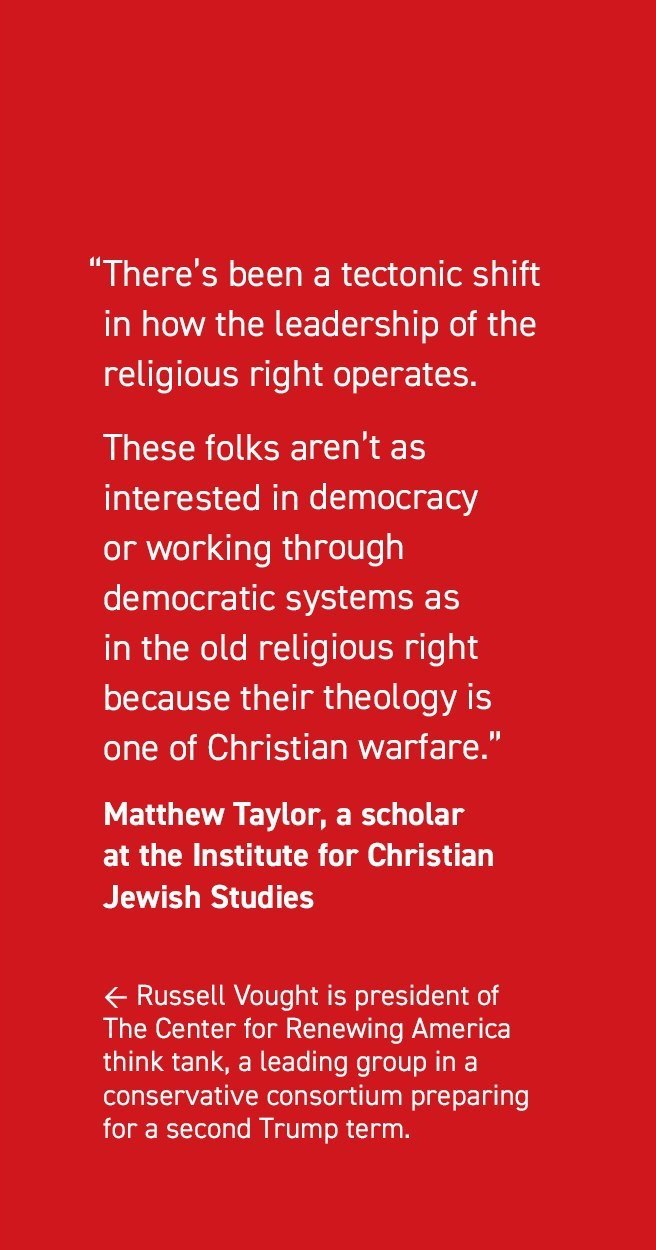
An influential conservative think tank close to Donald Trump is developing plans to infuse Christian nationalist ideas in his administration if the former president returns to power, according to documents that we obtained.
Spearheading the effort is Russell Vought, president of the Center for Renewing America (CRA). He’s rumored to be a potential chief of staff if Trump returns to the White House. Vought – who served in Trump’s first admin – has remained close to the former president and hopes to elevate Christian nationalism as a focal point in a potential second term, according to two people familiar with the plans, who were granted anonymity to discuss internal matters.
One document drafted by CRA includes a list of top priorities for a second Trump term, including “Christian nationalism,” invoking the Insurrection Act on Day One to quash protests and refusing to spend authorized congressional funds on unwanted projects, a practice banned by lawmakers in the Nixon era.
Vought also:
➡️ has said immigration requirements should include whether that person “accept[ed] Israel’s God, laws and understanding of history”
➡️ has a close affiliation with Christian nationalist William Wolfe, a former Trump admin official who has advocated for overturning same-sex marriage, ending abortion and reducing access to contraceptives
➡️ is advising the Heritage Foundation’s Project 2025, which would usher in one of the most conservative executive branches in modern American history. Proposals include repealing LGBTQ+ rights, increasing abortion surveillance and defunding Planned Parenthood.
Meanwhile, CRA is already influencing Trump’s positions. His thinking on withdrawing the U.S. from NATO and using military force against Mexican drug cartels is partly inspired by separate CRA papers, according to reports by Rolling Stone.
Trump’s campaign has repeatedly insisted that it alone is responsible for putting together a policy platform and staffing for a future administration. They declined to comment. So did Vought.
x
so many people claim that voting for biden would somehow be immoral given what's happening in gaza, but what these people fail to realize is that there are numerous issues at play. biden is at the top of the hill of shittiness; however, at the same time, we simply cannot allow what the right has planned to be carried out. it would not help gaza, and it would surely make life here worse for everyone, including those who want to see a free palestine.
#conservative think tank#christian nationalism#trump administration#russell vought#center for renewing america#christian values#political strategy#white house plans#christian right#us politics#presidential agenda#political priorities#religious influence#us government#conservative politics#trump agenda#government strategy#christian politics#political planning#political ideology.#gaza#israel#palestine#politics#joe biden#biden#03042024
4 notes
·
View notes
Text







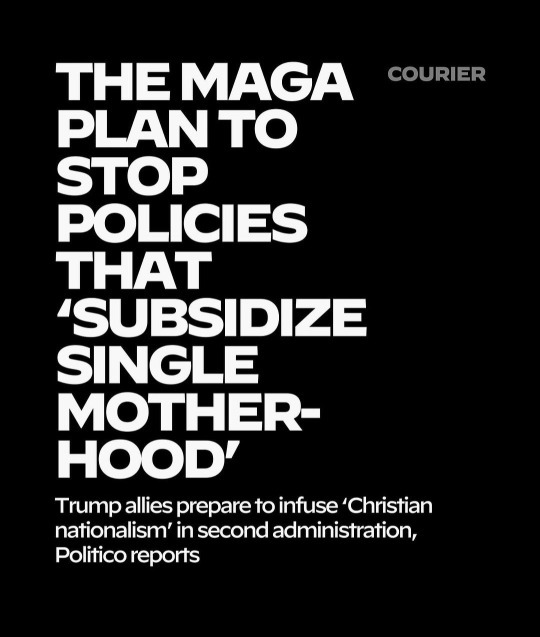
Trump and his allies plan to infuse "Christian nationalism" into his administration.
#trump#maga#christian nationalism#the heritage foundation#russell vought#please vote for democrats even if you don't agree with all the Biden policies with I/P#we can't allow another Trump term
1 note
·
View note
Text
1 note
·
View note
Text
Trump and Allies Forge Plans to Increase Presidential Power in 2025
The former president and his backers aim to strengthen the power of the White House and limit the independence of federal agencies.
By Jonathan Swan, Charlie Savage and Maggie Haberman/ New York Times/ July 17, 2023
Donald J. Trump and his allies are planning a sweeping expansion of presidential power over the machinery of government if voters return him to the White House in 2025, reshaping…

View On WordPress
#Charlie Savage#Federal Reserve#Heritage Foundation#John McEntee#Jonathan Swan#Justice Department#Maggie Haberman#New York Daily News#Russell T. Vought
3 notes
·
View notes
Text

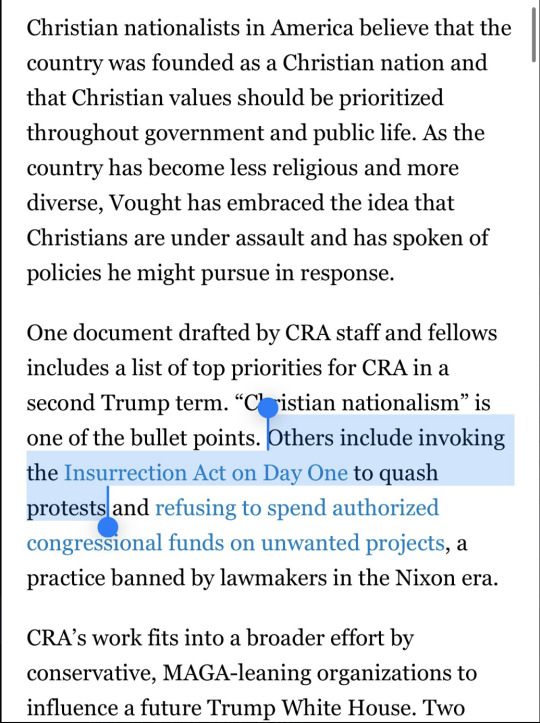
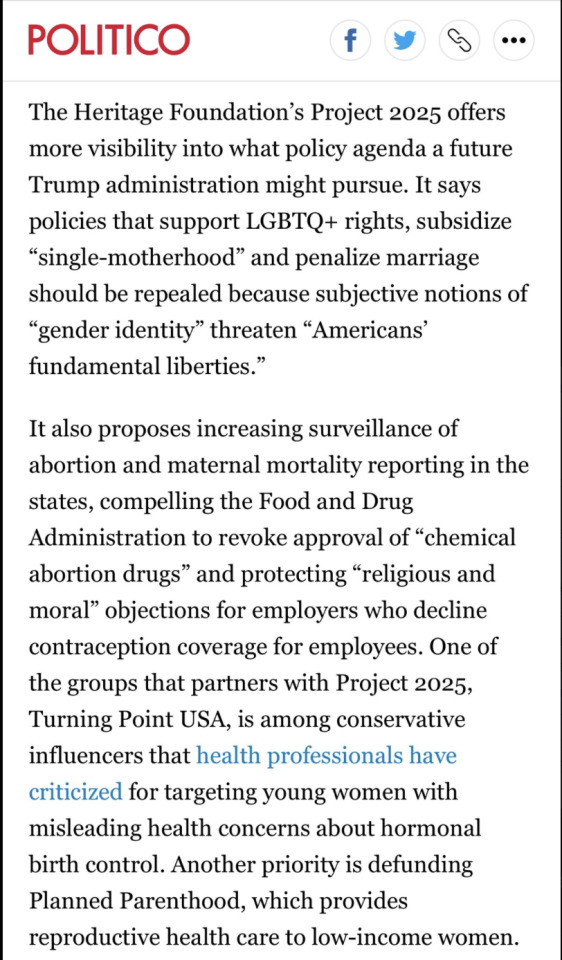

Amongst some of the proposals for a second Trump Admin:
- end surrogacy
- end no fault divorce
- invoke the insurrection act to stop protests
- end sex education in schools
- stop policies that “subsidize single motherhood”
#Donald Trump#Trump#2024 elections#politics#US politics#christian nationalism#fascisim#abortion#bodily autonomy
271 notes
·
View notes
Text
Cabinet Endorsements
One thing that's flown a bit below the radar in this election is that former cabinet members haven't been acting like they usually do. Normally, former cabinet members will automatically endorse their former boss for re-election, but Trump's have not been doing that.
This is of particular interest because, while we, the voters, get to see the President give speeches and the like, we don't actually work with him. Presumably a cabinet member is someone who agrees with the president and who the president trusts and who gets to work closely with the president, so their opinion of the president is an important benchmark.
With that in mind, let's take a look at the 44 former cabinet members of the Donald J. Trump administration and the 2 former cabinet members of the Joseph R. Biden administration. I'll put an (E) next to the ones that have endorsed their former boss, an (H) next to the ones who haven't yet, and an (R) next to the ones who have outright refused to do so.
Cabinet Members of the Donald J. Trump Administration
(R) VP Mike Pence
(H) Sec. State Rex Tillerson
(H) Sec. State/CIA Director Mike Pompeo
(E) Sec. Treasury Steven Mnuchin
(R) Sec. Defense James Mattis
(H) Sec. Defense Patrick Shanahan (nominated)
(R) Sec. Defense Mark Esper
(H) Sec. Defense Christopher Miller (acting)
(H) AG Jeff Sessions
(R) AG William Barr
(H) AG Jeffrey Rosen (acting)
(E) Sec. Interior Ryan Zinke
(H) Sec. Interior David Bernhardt
(H) Sec. Agriculture Sonny Perdue
(E) Sec. Commerce Wilbur Ross
(H) Sec. Labor Andrew Puzder (nominated)
(H) Sec. Labor Alex Acosta
(H) Sec. Labor Eugene Scalia
(H) Sec. HHS Tom Price
(H) Sec. HHS Alex Azar
(H) Sec. HHS Pete Gaynor
(E) Sec. HUD Ben Carson
(H) Sec. Transporation Elaine Chao
(H) Sec. Transportation Steven Bradbury (acting)
(H) Sec. Energy Rick Perry
(H) Sec. Energy Dan Brouillette
(H) Sec. Education Besty DeVos
(H) Sec. Education Mick Zais (acting)
(H) Sec. VA David Shulkin
(E) Sec. VA Ronny Jackson (nominated)
(H) Sec. VA Robert Wilkie
(R) Sec. HS John Kelly
(H) Sec. HS Kirstjen Nielsen
(H) Sec. HS Chad Wolf (nominated)
(E) US Trade Rep. Robert Lighthizer
(H) DNI Dan Coats
(H) DNI John Ratcliffe
(H) UN Ambassador Nikki Haley
(H) OMB Directory Mick Mulvaney
(E) OMB Director Russel Vought
(H) CIA Director Gina Haspel
(H) EPA Admin. Scott Pruitt
(H) EPA Admin. Andrew Wheeler
(H) SBA Admin. Linda McMahon
(H) SBA Admin. Jovita Caranza
Cabinet Members of the Joseph R. Biden Administration
(E) Sec. Labor Marty Walsh
(E) OMB Director Neera Tanden (nominated)
(H) Office of Science and Tech. Director Eric Lander
The first thing we notice, obviously, is that there are a whole lot more former Trump cabinet members. This is partially because Biden is still in office so his 23 current cabinet members are not counted (it'd be a huge surprise if they didn't endorse him and they probably wouldn't still be working for him if they didn't), but it's also because Trump had way above average turnover for cabinet officials, 19 in the first four years not including the 5 who resigned due to his handling of the 2020 election results (not included because Biden hasn't reached that point in his first term yet), while Biden has had far below average turnover, only 3 so far.
So a lot more people shuffling in and out of the Trump administration, but we also notice a ton more H's than E's there. Heck, there's almost as many R's among Trump's people as there are E's (5 to 7). Meanwhile, Biden's shooting 2 for 3 and the third one hasn't (at least not that I could find) ruled out endorsing him.
Keep in mind, endorsing the nominee of your party is pretty much the bare minimum that any party operative needs to do. Imagine if you applied for a job somewhere, the first question was "do you think this company should be in business", and you answered "no". You probably wouldn't be getting a job there. In other words, refusing to endorse has some big consequences for the people doing it, not just costing them a job in the potential next Republican presidency, but locking them out of the party entirely, and yet a good deal of the people who worked for Trump disliked working with him so much that they're doing it anyways.
As I said, this tends to fly below the radar because it's kind of a formulaic ritual; of course members of the President's party who are closely tied to him are going to endorse him for re-election! That's why you should pay attention now that most of the people who've worked with Trump aren't doing so. It says something, something big.
17 notes
·
View notes
Text

U.S. Marine Corps Vought F4U-1 Corsairs of Marine Fighting Squadron 123 (VMF-123) in the Russell Islands. 7 September 1943
45 notes
·
View notes
Text
5 notes
·
View notes
Text
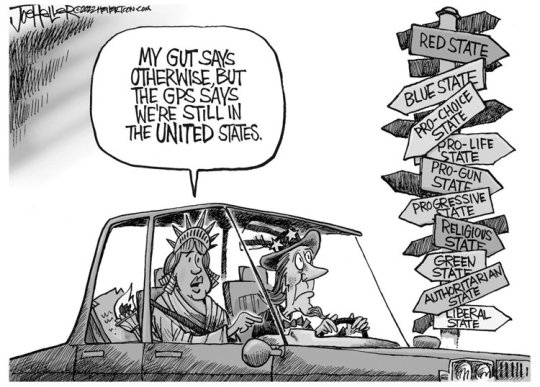
Joe Heller
* * * * *
LETTERS FROM AN AMERICAN
July 17, 2023
HEATHER COX RICHARDSON
JUL 18, 2023
A story in the New York Times today by Jonathan Swan, Charlie Savage, and Maggie Haberman outlined how former president Donald Trump and his allies are planning to create a dictatorship if voters return him to power in 2024. The article talks about how Trump and his loyalists plan to “centralize more power in the Oval Office” by “increasing the president’s authority over every part of the federal government that now operates, by either law or tradition, with any measure of independence from political interference by the White House.”
They plan to take control over independent government agencies and get rid of the nonpartisan civil service, purging all but Trump loyalists from the U.S. intelligence agencies, the State Department, and the Defense Department. They plan to start “impounding funds,” that is, ignoring programs Congress has funded if those programs aren’t in line with Trump’s policies.
“What we’re trying to do is identify the pockets of independence and seize them,” said Russell T. Vought, who ran Trump’s Office of Management and Budget and who now advises the right-wing House Freedom Caucus. They envision a “president” who cannot be checked by the Congress or the courts.
Trump’s desire to grab the mechanics of our government and become a dictator is not new; both scholars and journalists have called it out since the early years of his administration. What is new here is the willingness of so-called establishment Republicans to support this authoritarian power grab.
Behind this initiative is “Project 2025,” a coalition of more than 65 right-wing organizations putting in place personnel and policies to recommend not just to Trump, but to any Republican who may win in 2024. Project 2025 is led by the Heritage Foundation, once considered a conservative think tank, that helped to lead the Reagan revolution.
A piece by Alexander Bolton in The Hill today said that Republican senators are “worried” by the MAGAs, but they have been notably silent in public at a time when every elected leader should be speaking out against this plot. Their silence suggests they are on board with it, as Trump apparently hoped to establish.
The party appears to have fully embraced the antidemocratic ideology advanced by authoritarian leaders like Russia’s president Vladimir Putin and Hungary’s prime minister Viktor Orbán, who argue that the post–World War II era, in which democracy seemed to triumph, is over. They claim that the tenets of democracy—equality before the law, free speech, academic freedom, a market-based economy, immigration, and so on—weaken a nation by destroying a “traditional” society based in patriarchy and Christianity.
Instead of democracy, they have called for “illiberal” or “Christian” democracy, which uses the government to enforce their beliefs in a Christian, patriarchal order. What that looks like has a clear blueprint in the actions of Florida governor Ron DeSantis, who has gathered extraordinary power into his own hands in the state and used that power to mirror Orbán’s destruction of democracy.
DeSantis has pushed through laws that ban abortion after six weeks, before most people know they’re pregnant; banned classroom instruction on sexual orientation and gender identity (the “Don’t Say Gay” law); prevented recognition of transgender individuals; made it easier to sentence someone to death; allowed people to carry guns without training or permits; banned colleges and businesses from conversations about race; exerted control over state universities; made it harder for his opponents to vote, and tried to punish Disney World for speaking out against the Don’t Say Gay law. After rounding up migrants and sending them to other states, DeSantis recently has called for using “deadly force” on migrants crossing unlawfully.
Because all the institutions of our democracy are designed to support the tenets of democracy, right-wingers claim those institutions are weaponized against them. House Republicans are running hearings designed to prove that the Federal Bureau of Investigation and the Department of Justice are both “weaponized” against Republicans. It doesn’t matter that they don’t seem to have any evidence of bias: the very fact that those institutions support democracy mean they support a system that right-wing Republicans see as hostile.
“Our current executive branch,” Trump loyalist John McEntee, who is in charge of planning to pack the government with Trump loyalists, told the New York Times reporters, “was conceived of by liberals for the purpose of promulgating liberal policies. There is no way to make the existing structure function in a conservative manner. It’s not enough to get the personnel right. What’s necessary is a complete system overhaul.”
It has taken decades for the modern-day Republican Party to get to a place where it rejects democracy. The roots of that rejection lie all the way back in the 1930s, when Democrats under Franklin Delano Roosevelt embraced a government that regulated business, provided a basic social safety net, and promoted infrastructure. That system ushered in a period from 1933 to 1981 that economists call the “Great Compression,” when disparities of income and wealth were significantly reduced, especially after the government also began to protect civil rights.
Members of both parties embraced this modern government in this period, and Americans still like what it accomplished. But businessmen who hated regulation joined with racists who hated federal protection of civil rights and traditionalists who opposed women’s rights and set out to destroy that government.
In West Palm Beach, Florida, last weekend, at the Turning Points Action Conference, Representative Marjorie Taylor Greene (R-GA) compared President Biden’s Build Back Better plan to President Lyndon Baines Johnson’s Great Society programs, which invested in “education, medical care, urban problems, rural poverty, transportation, Medicare, Medicaid, food stamps, and welfare, the Office of Economic Opportunity, and big labor and labor unions.” She noted that under Biden, the U.S. has made “the largest public investment in social infrastructure and environmental programs, that is actually finishing what FDR started, that LBJ expanded on, and Joe Biden is attempting to complete.”
Well, yeah.
Greene incorrectly called this program “socialism,” which in fact means government ownership of production, as opposed to the government’s provision of benefits people cannot provide individually, a concept first put into practice in the United States by Abraham Lincoln and later expanded by leadership in both parties. The administration has stood firmly behind the idea—shared by LBJ and FDR, and also by Republicans Lincoln, Theodore Roosevelt, and Dwight Eisenhower, among others—that investing in programs that enable working people to prosper is the best way to strengthen the economy.
Certainly, Greene’s speech didn’t seem to be the “gotcha” that she apparently hoped. A March 2023 poll by independent health policy pollster KFF, for example, found that 80% of Americans like Social Security, 81% like Medicare, and 76% like Medicaid, a large majority of members of all political parties.
The White House Twitter account retweeted a clip of Greene’s speech, writing: “Caught us. President Biden is working to make life easier for hardworking families.”
—
LETTERS FROM AN AMERICAN
HEATHER COX RICHARDSON
#heather cox richardson#letters from an american#Right Wing Think Tanks#MAGA#The Federalist Society#The Heritage Foundation#Jonathan Swan#Charlie Savage#Maggie Haberman#NYTimes#Election 2024#fascism#democracy
13 notes
·
View notes
Note
Okay things are going a little too fast right now with a response is about project 2025,
First about Biden I saw this post that was saying that project 2025 is already here and Biden is already moving those goals and you did criticized Biden for being an enemy to LGBT+ by radicalizing him and I kind of got the impression that he shouldn't explicitly support the movement.
https://www.tumblr.com/decolonize-the-left/745588100726734848/i-saw-your-post-about-the-leopards-eating-faces
Secondly I kind of felt the same way with it not being talked about anywhere. Not even like popular people that like covers politics at times don't even bring it up like not even as like an offhanded comment.
3rd verify this a little bit more there are people that kind of sounds like they support it and is that that people from Trump's administration like Jonathan Berry; Ben Carson; Ken Cuccinelli; Rick Dearborn; Thomas Gilman; Mandy Gunasekara; Gene Hamilton; Christopher Miller; Bernard McNamee; Stephen Moore; Mora Namdar; Peter Navarro; William Perry Pendley; Diana Furchtgott-Roth; Kiron Skinner; Roger Severino; Hans von Spakovsky; Brooks Tucker; Russell Vought; and Paul Winfree support it.
Yeaaaaah a racist they/them with a cashapp link in their bio is exactly the kind of outrage hustler I'd expect to be propping up something like Project 2025. That's exactly why it's bullshit. Nobody but these people are talking about it. They're the QAnon of the left.
So I'm going to roll your previous question about Biden (now that I know what you meant) in with your question about Trump, since my answer is the same in both cases. So here we go. Project 2025 is a very detailed proposal that touches on literally every single aspect of politics. Just by the law of averages, you're going to find politicians in every party doing something outlined on the Project 2025 website solely because there's so much there. And similarly, you're going to find a lot of good ideas and a lot of bad ideas solely because there are so many ideas and proposals presented. There are hundreds of pages of PDFs on that site. I have not read them all, not even close. But I did randomly skim to get an idea of what they're putting out there, and there's a lot of common sense stuff in there. Like shrinking the bureaucracy and dismantling Homeland Security entirely. There's stuff about eliminating security flaws in certain government offices and ending the department of education and putting the states back in charge of their own schools. Most of these things I'm reading with my random skim are pretty mainstream modern conservative/libertarian positions. Again, I'm not reading the whole thing, and I won't because I'm not insane, but I'm not seeing anything in what I'm reading, or in the headlines of each different chapter, that warrants the kind of pearl clutching panic the fringe left seems to have for this thing.
As for the endorsements, the site has a list of 100 organizations that they claim support the Project, but they link to no statements or even to the organizations themselves, so I have no idea how legit the endorsements are or where you're getting your info about the people you listed above. I'm going to guess it's from a left wing website unless you personally went out and found statements from these people supporting the Project, and I'm gonna tell you right now, if you did get it from a far left website I'm just going to assume they're lying, just like I'm going to assume they're lying about everything they're saying about Project 2025 since that's what sites like that tend to do. Lie to keep people scared, keep the clicks coming, and keep those cashapp transfers going strong.
5 notes
·
View notes
Text
By Mark Frauenfelder
Boing Boing
July 17, 2023
Donald Trump and his allies are following the fascist playbook to the letter, with plans to undermine democratic checks and balances and "reshape the structure of the executive branch to concentrate far greater authority directly in his hands," reports The New York Times.
If Trump wins the election, independent agencies such as the Federal Communications Commission and the Federal Trade Commission would come under direct presidential control. Trump would also purge intelligence agencies, the State Department, and defense bureaucracies of officials Trump calls "the sick political class that hates our country."
As reported in The New York Times:
He wants to revive the practice of "impounding" funds, refusing to spend money Congress has appropriated for programs a president doesn't like — a tactic that lawmakers banned under President Richard Nixon.
He intends to strip employment protections from tens of thousands of career civil servants, making it easier to replace them if they are deemed obstacles to his agenda.
…
"What we're trying to do is identify the pockets of independence and seize them," said Russell T. Vought, who ran the Office of Management and Budget in the Trump White House and now runs a policy organization, the Center for Renewing America.
2 notes
·
View notes
Text
Trump and Allies Forge Plans to Increase Presidential Power in 2025
The former president and his backers aim to strengthen the power of the White House and limit the independence of federal agencies. (NYT, 7/17/23)
The agenda being pursued has deep roots in the decades-long effort by conservative legal thinkers to undercut what has become known as the administrative state — agencies that enact regulations aimed at keeping the air and water clean and food, drugs and consumer products safe, but that cut into business profits.
Donald J. Trump and his allies are planning a sweeping expansion of presidential power over the machinery of government if voters return him to the White House in 2025, reshaping the structure of the executive branch to concentrate far greater authority directly in his hands.
Their plans to centralize more power in the Oval Office stretch far beyond the former president’s recent remarks that he would order a criminal investigation into his political rival, President Biden, signaling his intent to end the post-Watergate norm of Justice Department independence from White House political control.
Mr. Trump and his associates have a broader goal: to alter the balance of power by increasing the president’s authority over every part of the federal government that now operates, by either law or tradition, with any measure of independence from political interference by the White House, according to a review of his campaign policy proposals and interviews with people close to him.
Mr. Trump intends to bring independent agencies — like the Federal Communications Commission, which makes and enforces rules for television and internet companies, and the Federal Trade Commission, which enforces various antitrust and other consumer protection rules against businesses — under direct presidential control.
He wants to revive the practice of “impounding” funds, refusing to spend money Congress has appropriated for programs a president doesn’t like — a tactic that lawmakers banned under President Richard Nixon.
He intends to strip employment protections from tens of thousands of career civil servants, making it easier to replace them if they are deemed obstacles to his agenda. And he plans to scour the intelligence agencies, the State Department and the defense bureaucracies to remove officials he has vilified as “the sick political class that hates our country.”
“The president’s plan should be to fundamentally reorient the federal government in a way that hasn’t been done since F.D.R.’s New Deal,” said John McEntee, a former White House personnel chief who began Mr. Trump’s systematic attempt to sweep out officials deemed to be disloyal in 2020 and who is now involved in mapping out the new approach.
“Our current executive branch,” Mr. McEntee added, “was conceived of by liberals for the purpose of promulgating liberal policies. There is no way to make the existing structure function in a conservative manner. It’s not enough to get the personnel right. What’s necessary is a complete system overhaul.”
Mr. Trump and his advisers are making no secret of their intentions — proclaiming them in rallies and on his campaign website, describing them in white papers and openly discussing them.
“What we’re trying to do is identify the pockets of independence and seize them,” said Russell T. Vought, who ran the Office of Management and Budget in the Trump White House and now runs a policy organization, the Center for Renewing America.
The strategy in talking openly about such “paradigm-shifting ideas” before the election, Mr. Vought said, is to “plant a flag” — both to shift the debate and to later be able to claim a mandate. He said he was delighted to see few of Mr. Trump’s Republican primary rivals defend the norm of Justice Department independence after the former president openly attacked it.
Steven Cheung, a spokesman for Mr. Trump’s campaign, said in a statement that the former president has “laid out a bold and transparent agenda for his second term, something no other candidate has done.” He added, “Voters will know exactly how President Trump will supercharge the economy, bring down inflation, secure the border, protect communities and eradicate the deep state that works against Americans once and for all.”
The two driving forces of this effort to reshape the executive branch are Mr. Trump’s own campaign policy shop and a well-funded network of conservative groups, many of which are populated by former senior Trump administration officials who would most likely play key roles in any second term.
Mr. Vought and Mr. McEntee are involved in Project 2025, a $22 million presidential transition operation that is preparing policies, personnel lists and transition plans to recommend to any Republican who may win the 2024 election. The transition project, the scale of which is unprecedented in conservative politics, is led by the Heritage Foundation, a think tank that has shaped the personnel and policies of Republican administrations since the Reagan presidency.
That work at Heritage dovetails with plans on the Trump campaign website to expand presidential power that were drafted primarily by two of Mr. Trump’s advisers, Vincent Haley and Ross Worthington, with input from other advisers, including Stephen Miller, the architect of the former president’s hard-line immigration agenda.
Some elements of the plans had been floated when Mr. Trump was in office but were impeded by internal concerns that they would be unworkable and could lead to setbacks. And for some veterans of Mr. Trump’s turbulent White House who came to question his fitness for leadership, the prospect of removing guardrails and centralizing even greater power over government directly in his hands sounded like a recipe for mayhem.
“It would be chaotic,” said John F. Kelly, Mr. Trump’s second White House chief of staff. “It just simply would be chaotic, because he’d continually be trying to exceed his authority but the sycophants would go along with it. It would be a nonstop gunfight with the Congress and the courts.”
The agenda being pursued has deep roots in the decades-long effort by conservative legal thinkers to undercut what has become known as the administrative state — agencies that enact regulations aimed at keeping the air and water clean and food, drugs and consumer products safe, but that cut into business profits.
Its legal underpinning is a maximalist version of the so-called unitary executive theory.
The legal theory rejects the idea that the government is composed of three separate branches with overlapping powers to check and balance each other. Instead, the theory’s adherents argue that Article 2 of the Constitution gives the president complete control of the executive branch, so Congress cannot empower agency heads to make decisions or restrict the president’s ability to fire them. Reagan administration lawyers developed the theory as they sought to advance a deregulatory agenda.
“The notion of independent federal agencies or federal employees who don’t answer to the president violates the very foundation of our democratic republic,” said Kevin D. Roberts, the president of the Heritage Foundation, adding that the contributors to Project 2025 are committed to “dismantling this rogue administrative state.”
Personal power has always been a driving force for Mr. Trump. He often gestures toward it in a more simplistic manner, such as in 2019, when he declared to a cheering crowd, “I have an Article 2, where I have the right to do whatever I want as president.”
Mr. Trump made the remark in reference to his claimed ability to directly fire Robert S. Mueller III, the special counsel in the Russia inquiry, which primed his hostility toward law enforcement and intelligence agencies. He also tried to get a subordinate to have Mr. Mueller ousted, but was defied.
Early in Mr. Trump’s presidency, his chief strategist, Stephen K. Bannon, promised a “deconstruction of the administrative state.” But Mr. Trump installed people in other key roles who ended up telling him that more radical ideas were unworkable or illegal. In the final year of his presidency, he told aides he was fed up with being constrained by subordinates.
Now, Mr. Trump is laying out a far more expansive vision of power in any second term. And, in contrast with his disorganized transition after his surprise 2016 victory, he now benefits from a well-funded policymaking infrastructure, led by former officials who did not break with him after his attempts to overturn the 2020 election and the Jan. 6, 2021, attack on the Capitol.
One idea the people around Mr. Trump have developed centers on bringing independent agencies under his thumb.
Congress created these specialized technocratic agencies inside the executive branch and delegated to them some of its power to make rules for society. But it did so on the condition that it was not simply handing off that power to presidents to wield like kings — putting commissioners atop them whom presidents appoint but generally cannot fire before their terms end, while using its control of their budgets to keep them partly accountable to lawmakers as well. (Agency actions are also subject to court review.)
Presidents of both parties have chafed at the agencies’ independence. President Franklin D. Roosevelt, whose New Deal created many of them, endorsed a proposal in 1937 to fold them all into cabinet departments under his control, but Congress did not enact it.
Later presidents sought to impose greater control over nonindependent agencies Congress created, like the Environmental Protection Agency, which is run by an administrator whom a president can remove at will. For example, President Ronald Reagan issued executive orders requiring nonindependent agencies to submit proposed regulations to the White House for review. But overall, presidents have largely left the independent agencies alone.
Mr. Trump’s allies are preparing to change that, drafting an executive order requiring independent agencies to submit actions to the White House for review. Mr. Trump endorsed the idea on his campaign website, vowing to bring them “under presidential authority.”
Such an order was drafted in Mr. Trump’s first term — and blessed by the Justice Department — but never issued amid internal concerns. Some of the concerns were over how to carry out reviews for agencies that are headed by multiple commissioners and subject to administrative procedures and open-meetings laws, as well as over how the market would react if the order chipped away at the Federal Reserve’s independence, people familiar with the matter said.
The Federal Reserve was ultimately exempted in the draft executive order, but Mr. Trump did not sign it before his presidency ended. If Mr. Trump and his allies get another shot at power, the independence of the Federal Reserve — an institution Mr. Trump publicly railed at as president — could be up for debate. Notably, the Trump campaign website’s discussion of bringing independent agencies under presidential control is silent on whether that includes the Fed.
Asked whether presidents should be able to order interest rates lowered before elections, even if experts think that would hurt the long-term health of the economy, Mr. Vought said that would have to be worked out with Congress. But “at the bare minimum,” he said, the Federal Reserve’s regulatory functions should be subject to White House review.
“It’s very hard to square the Fed’s independence with the Constitution,” Mr. Vought said.
Other former Trump administration officials involved in the planning said there would also probably be a legal challenge to the limits on a president’s power to fire heads of independent agencies. Mr. Trump could remove an agency head, teeing up the question for the Supreme Court.
The Supreme Court in 1935 and 1988 upheld the power of Congress to shield some executive branch officials from being fired without cause. But after justices appointed by Republicans since Reagan took control, it has started to erode those precedents.
Peter L. Strauss, professor emeritus of law at Columbia University and a critic of the strong version of the unitary executive theory, argued that it is constitutional and desirable for Congress, in creating and empowering an agency to perform some task, to also include some checks on the president’s control over officials “because we don’t want autocracy” and to prevent abuses.
“The regrettable fact is that the judiciary at the moment seems inclined to recognize that the president does have this kind of authority,” he said. “They are clawing away agency independence in ways that I find quite unfortunate and disrespectful of congressional choice.”
Mr. Trump has also vowed to impound funds, or refuse to spend money appropriated by Congress. After Nixon used the practice to aggressively block agency spending he was opposed to, on water pollution control, housing construction and other issues, Congress banned the tactic.
On his campaign website, Mr. Trump declared that presidents have a constitutional right to impound funds and said he would restore the practice — though he acknowledged it could result in a legal battle.
Mr. Trump and his allies also want to transform the civil service — government employees who are supposed to be nonpartisan professionals and experts with protections against being fired for political reasons.
The former president views the civil service as a den of “deep staters” who were trying to thwart him at every turn, including by raising legal or pragmatic objections to his immigration policies, among many other examples. Toward the end of his term, his aides drafted an executive order, “Creating Schedule F in the Excepted Service,” that removed employment protections from career officials whose jobs were deemed linked to policymaking.
Mr. Trump signed the order, which became known as Schedule F, near the end of his presidency, but President Biden rescinded it. Mr. Trump has vowed to immediately reinstitute it in a second term.
Critics say he could use it for a partisan purge. But James Sherk, a former Trump administration official who came up with the idea and now works at the America First Policy Institute — a think tank stocked heavily with former Trump officials — argued it would only be used against poor performers and people who actively impeded the elected president’s agenda.
“Schedule F expressly forbids hiring or firing based on political loyalty,” Mr. Sherk said. “Schedule F employees would keep their jobs if they served effectively and impartially.”
Mr. Trump himself has characterized his intentions rather differently — promising on his campaign website to “find and remove the radicals who have infiltrated the federal Department of Education” and listing a litany of targets at a rally last month.
“We will demolish the deep state,” Mr. Trump said at the rally in Michigan. “We will expel the warmongers from our government. We will drive out the globalists. We will cast out the communists, Marxists and fascists. And we will throw off the sick political class that hates our country.”
#jesus christ this is terrifying#Republicans are terrifying#U.S. elections 2024#American politics#jesus#christ#next he'll try to do away with term limits#he wants to be Putin#i just#key smash
1 note
·
View note
Text
1 note
·
View note
Text
1 note
·
View note